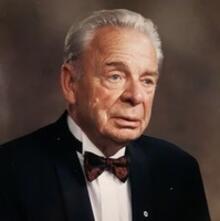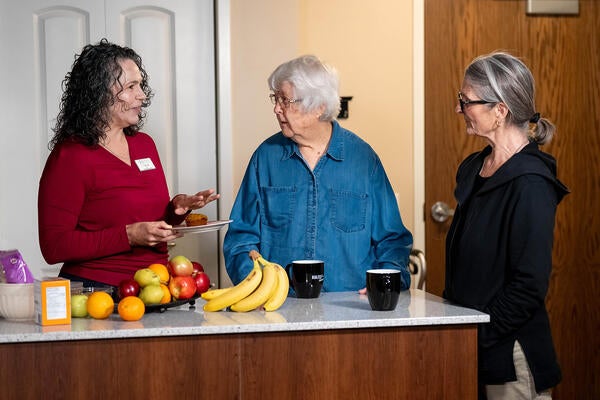When Ken Murray founded the Murray Alzheimer Research and Education Program (MAREP), he wanted to help people living with dementia in their everyday lives.
Ken’s vision looked beyond a search for a cure. Instead, he wanted to create a program to improve the lives of people living with dementia and provide care partners with practical resources.
Any innovation that can contribute to improving the quality of life of individuals with these conditions and their families and caregivers is like bringing water to someone wandering in the desert.
Ken had taken the unexpected and challenging role of care partner when his first wife, Helen, was diagnosed with Alzheimer’s disease. When he needed support, he reached out to the University of Waterloo’s Faculty of Applied Health Sciences. Eventually, his partnership with Waterloo grew, and he founded MAREP in 1993. As a result, thousands of families and individuals have improved their lives with MAREP’s resources and services.
Invaluable resources for families and researchers
Over the years, the program has created research initiatives, resources that translate research for practical use, and valuable support systems. For many, even the simplest support provides much-needed relief.
“Any innovation that can contribute to improving the quality of life of individuals with these conditions and their families and care partners is like bringing water to someone wandering in the desert,” explains Jim Rush, a professor in applied health sciences.
MAREP was the first in Canada to create a forum that brought people with dementia together with partners-in-care to learn with and from each other. With resources like the national A Changing Melody forum and the By Us For Us guides, families coping with dementia were able to gain the knowledge they needed and foster supportive communities with people facing the same challenges as them.
Ken’s vision and support tangibly changed the quality of life for countless individuals living with dementia, as well as for family members and those providing dementia-related care.
The program also spawned numerous research initiatives. Some initiatives were even inspired by those involved in MAREP. It led to academic events, including Hack4Health – a hackathon that challenges participants to solve issues related to Alzheimer’s disease, dementia, or Multiple Sclerosis.
Inspiring philanthropy in others
In addition to his own generous support, Ken was instrumental in helping to raise funds for MAREP, through initiatives like the Friends of Ken Murray campaign. With his vision, dedication, and philanthropic support, MAREP became a pioneer in integrating research with education and outreach. The program improved dementia care practices in Canada and beyond.
 “Ken’s vision and support tangibly changed the quality of life for countless individuals living with dementia, as well as for family members and those providing dementia-related care,” explains Paul Stolee, interim dean of applied health sciences. “Giving back was an integral part of his background and he amplified his impact across the community by inspiring everyone he met along the way.”
“Ken’s vision and support tangibly changed the quality of life for countless individuals living with dementia, as well as for family members and those providing dementia-related care,” explains Paul Stolee, interim dean of applied health sciences. “Giving back was an integral part of his background and he amplified his impact across the community by inspiring everyone he met along the way.”
As Ken’s passion for teaching and research grew, he expanded his generosity by creating student scholarships. One graduate award was formed to honor his 75th birthday. Created to continue the tradition of philanthropy and leadership in the Murray family, Ken and his daughters established the Susan Pearce and Leslie Harwood Endowment Scholarship.
Ken passed away on March 2, 2019, but his vision lives on. Today, MAREP is based in the Schlegel-UW Research Institute for Aging, where the program continues its trailblazing services, supporting families and individuals to improve their knowledge, communities, and lives.
Related stories

Read more
Capstones, collaboration and community
Redefining capstone learning by bringing students, faculty and community partners together to tackle real-world challenges

Read more
Using AI to accelerate drug development
How machine learning empowers collaboration between computer science, math and medical research

Read more
Opinion: Canada needs more research on aging, nutrition and well-being in LTC
Dr. Heather Keller discusses the need to transform mealtimes in Canada’s long-term care homes from a service to a meaningful form of care





